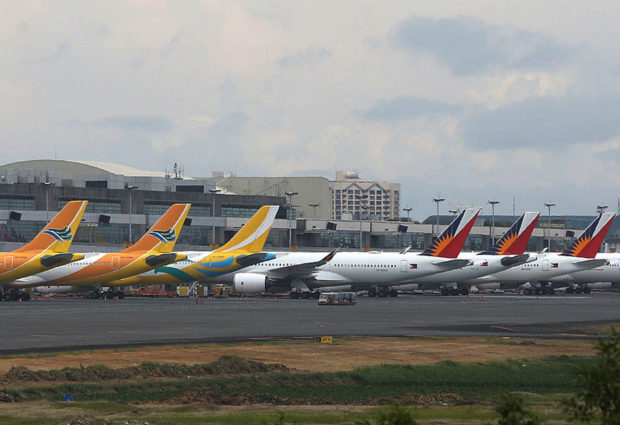
GROUNDED In this May 3 photo, several passenger planes are seen parked at Ninoy Aquino International Airport Terminal 2 during the lockdown on Luzon and much of the country amid the threat of the coronavirus pandemic. —MARIANNE BERMUDEZ
The government should use Philippine airlines to transport COVID-19 vaccines to the country to help them survive the coronavirus pandemic, a lawmaker said on Sunday.
“I am assuming that we will get the vaccines from where they are being produced. Instead of foreign carriers, let us use local airlines to help them earn more at this time of pandemic so they would keep their employees,” Quezon City Rep. Precious Hipolito Castelo said in a statement.
She said foreign airlines may be used if Philippine carriers could not meet the requirements for transporting vaccines.
Castelo cited estimates that it would take more than 50 Boeing 777 freighters to transport 60 million doses of a vaccine to Manila.
Once the vaccines arrive in the Philippines, she said, the next step is to fly it to various parts of the country, which would require the services of not only the major local carriers but also of the small airlines that operate out of Manila, Clark, and other regional airports.“The government can help them avoid shedding more manpower [by engaging] their services in the delivery of the vaccine,” Castelo said.
In October, Philippine Airlines said it was reducing its workforce by up to 35 percent, affecting 2,700 employees, as part of a plan to survive the pandemic.
Cebu Pacific, the country’s largest budget airline, announced in July that it was cutting its workforce by 25 percent, or more than 800 employees.
AirAsia has also announced plans to reduce its workforce by 12 percent, or 260 workers.
Food and Drug Administration (FDA) chief Eric Domingo has said COVID-19 vaccines may become available in the Philippines by March 2021 after President Duterte has allowed the agency to expedite grants of emergency use authorization to successful vaccines from the usual six months to 21 days.
The Philippines recorded 1,768 additional coronavirus infections on Sunday, raising the overall number of confirmed COVID-19 cases in the country to 439,834.
Quezon City reported the most number of new cases, 112, followed by Laguna (94), Rizal (90), Davao City (71) and Benguet (69).
The Department of Health said 9,062 more patients had recovered, pushing the total number of COVID-19 survivors to 408,634. But the death toll rose to 8,554 with the deaths of 29 more patients.
The deaths and recoveries left the country with 22,646 active cases, of which 84.2 percent were mild, 6.2 percent asymptomatic, 0.34 percent moderate, 3.1 percent severe, and 6.1 percent critical.